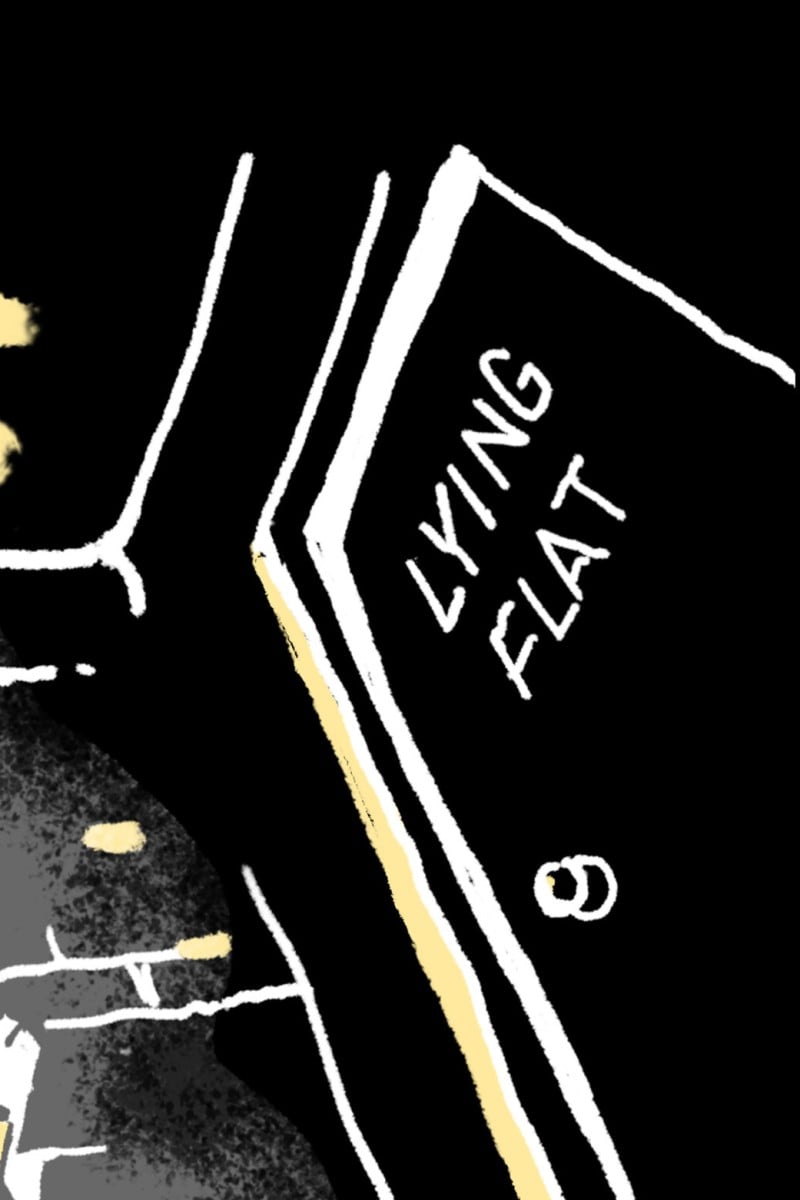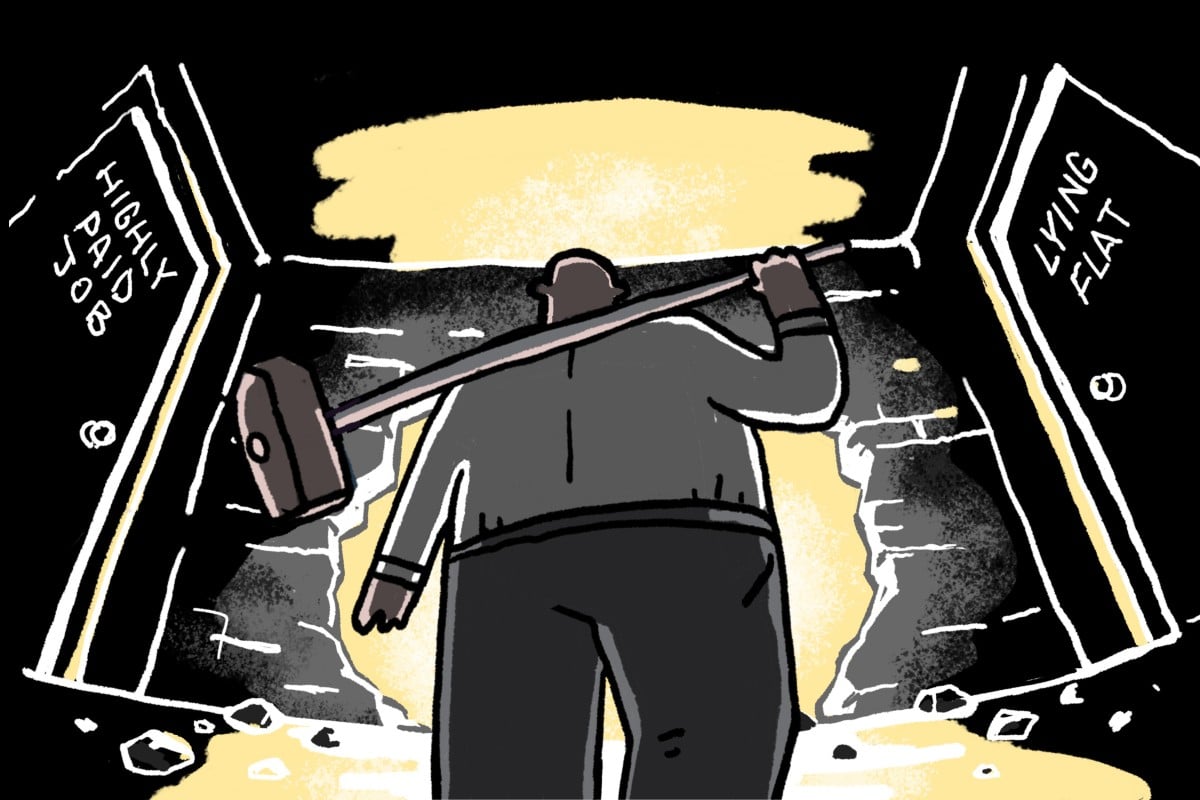
- Originating on social media in mainland China, the ‘lying flat’ trend of working the bare minimum to get by has worried the city’s education officials
- Some social workers and academics say there may be underlying issues causing young Hongkongers to opt out of the rat race of school and work
 Some experts say young Hongkongers are not “lying flat” but are just trying to find a better future for themselves. Illustration: Perry Tse
Some experts say young Hongkongers are not “lying flat” but are just trying to find a better future for themselves. Illustration: Perry Tse Hot Topics takes an issue that’s being discussed in the news and allows you to compare and analyse different news articles and viewpoints on the subject. Our questions encourage you to examine the topic in-depth and can be used on your own, or with a friend.
Context: Hong Kong official says city’s youth are ‘lying flat’ and being ‘self-indulgent’
Hong Kong’s Secretary for Education Kevin Yeung Yun-hung accused the city’s youth of “lying flat”, rejecting hard work and adopting an unconcerned attitude towards life in a blog post last November. He described this mentality as “passive and self-indulgent”.
“This passive mindset makes people feel dispirited, and it ... hinders the development of society,” Yeung warned in his blog post.
Lying flat became quite popular in mainland China, especially among the younger generation, after a viral online post in April 2021.
Hot topics: China’s crackdown on entertainment industry
On the Baidu Tieba social media platform, a man in his 20s named Luo Huazhong wrote about how he had embraced this lifestyle of minimalism for two years. Luo explained how he was living a low-desire, zero-pressure lifestyle without a stable job, while staying with his parents in Zhejiang province.
“Lying flat is a state of mind ... I feel that many things are not worthy of my attention and energy,” Luo said.
His mindset struck a chord with much of mainland China’s young and disenchanted workforce that had been hit particularly hard by the nation’s economic slowdown and the coronavirus pandemic. From white-collar workers to university students, frustrated young people took to social media to declare themselves “lying flat youth”.
Authorities have been scrambling to suppress the trend, fearing that it could challenge social and economic order. According to economists and social commentators, lying flat in the long run could affect mainland China’s economy. It might also lower the country’s birth rate and threaten its social welfare system.
It even warranted a public condemnation by President Xi Jinping.
“It is necessary to prevent the stagnation of the social class ... and form an environment for improvement in which everyone participates, avoiding ... lying flat,” Xi said in comments published in October 2021 by the Communist Party’s journal on political theory, Qiushi.
Staff writers
Question prompts:
-
What is your opinion of Luo Huazhong’s lifestyle and the “lying flat” trend? Explain using Context, Glossary and your knowledge.
-
Identify and elaborate on ONE factor that has influenced the trend of lying flat in mainland China.
Illustration
Question prompts:
-
What is being shown on the screens that are depicted in this cartoon?
-
Based on your answer above, explain what this cartoon suggests about why the “lying flat” trend has been frowned upon by authorities in mainland China. Use Context and Glossary to support your answer.
News: Young Hongkongers’ different life choices don’t mean they lack drive or creativity, experts say
Some young Hongkongers are adopting the “lying flat” lifestyle, choosing to reject the rat race and hard work and preferring to earn only enough for their basic needs.
One example is University of Hong Kong student Tang Tsz-wa*, 22, who said he was unbothered by what life might hold after graduation.
Tang said: “I won’t look for a job with a high salary or high status. As long as I don’t starve or work too hard because of the job, I’ll be OK with it.”
Secretary for Education Kevin Yeung Yun-hung has attacked lying flat as “passive and self-indulgent”.
However, some experts disagreed with Yeung that young Hongkongers were lazy or lying flat. They stressed that young people’s lifestyles might be different, but they did not lack drive or creativity.
Veteran social worker Chan Ka-ling, an assistant executive director of Youth Outreach, an NGO helping at-risk youth, dismissed criticism of young people for choosing a different pace of life.
She felt that part of the reason young people were making different choices these days was that more were coming from complex family backgrounds. These complicated arrangements left some young people distressed and distorted their values, which had an impact on their relationships too.
Hong Kong students showing signs of depression due to stress over new school year
Teacher Amy Chan*, a counsellor in a Kowloon West secondary school with mainly low-income students, said lying flat did not equate to laziness.
Chan said many of her students who came from tiny, cramped homes desperately wanted to climb the social ladder but struggled to cope with the demands of six years of secondary school. More adolescents were stressed and dealing with mental health issues these days, she added.
Teens could develop a more positive outlook if teachers had more time to talk to students, she added, but most teachers were already overloaded with responsibilities.
Meanwhile, a recent study by Chinese University found that 803 respondents aged between 15 and 30 gave average scores of only 2.95 and 4.76 out of 10 for their level of optimism about Hong Kong and their future, respectively. Both scores fell from 4.37 and 6.02 in 2018.
* Names changed at interviewees’ request.
Staff writers
Question prompts:
-
“Young Hongkongers are opting for a different lifestyle out of necessity.” How might News support or debunk this claim? Explain.
-
In News, what is the purpose of including the Chinese University survey on optimism about Hong Kong? Based on your answer, explain what might be the relationship between one’s optimism and motivation to work hard.
Issue: Hong Kong schools must infuse civic, moral values into all subjects to overcome laziness
To address a “passive and self-indulgent mindset” in some young people, Hong Kong schools will need to infuse into all subjects civic values such as diligence, under a revised framework on civic values issued in November 2021.
Replacing the eight-page “Moral and Civic Education Curriculum Framework” of 2008, the revised guidelines add three new values, namely law-abidingness, empathy and diligence, to the existing seven – perseverance, respect for others, responsibility, national identity, commitment, integrity and care for others.
In an earlier blog post, Secretary for Education Kevin Yeung Yun-hung wrote that the new framework was needed as he was worried by the self-indulgent attitude of some young people and the trending idea of “lying flat”.
The “Values Education Framework”, as the new guidelines are known, echoed that language, suggesting young people today had expectations of “reaping without sowing”, and a “fluke mindset” that left life up to chance. It also expressed hope that students would work hard and contribute to their families, society and country.
However, Gary Tang Kin-yat, an assistant professor at the Department of Social Science of Hang Seng University disagreed that adding “diligence” to the list of values schools must teach would address the issues of inertia, or lack of motivation or ambition associated with lying flat.
“We do not train students to be diligent but motivate them to discover their passions and interests,” he said.
If young Hongkongers were rejecting the usual choices, Tang added, it could be because they were in a state of hopelessness from gaining no recognition for non-academic areas in which they excelled.
Asking for a Friend: Help! I’m totally burned out, and I can’t study
Final-year sociology student Emalia Au Yeung*, 22, said: “It is important to teach students about diligence so they can survive in society, but I don’t think diligence and lying flat have a cause and effect relationship.”
A student of the University of Toronto in Canada, she said her priority after graduation would be comfort, not a high salary or promising career.
“I won’t say I’m lazy,” she said. “I just don’t want to compete with others. I don’t want to make money that I won’t have time to spend.”
* Name changed at interviewee’s request.
Staff writers
Question prompts:
-
What are Emalia Au Yeung’s reasons for her post-graduation plans? What might be the societal factors behind her choice?
-
Identify TWO methods mentioned in Issue to address the “lying flat” phenomenon in youth. Which of the two do you think is more effective, and why? Explain using News, Issue and your own knowledge.
Your Voice: Why Hong Kong’s stressed students need sleep (long letters)
Glossary
-
Lying flat: also known as tang ping in mainland China. It means doing the bare minimum to get by, and striving for nothing more than what is absolutely essential for one’s survival. This can include rejecting societal norms and expectations to study hard, buy a home, or even start a family. The term originated from a viral online post in April 2021 on the Baidu Tieba social media platform.
-
Rat race: refers to a way of life in which people are caught up in a fiercely competitive struggle for power and money
-
Social welfare system: government programmes that provide assistance to individuals and families in need such as the elderly, retired and the unemployed. These are typically funded through taxation.
-
Values Education Curriculum Framework: refers to a 89-page guideline on education to cultivate positive values and attitudes in Hong Kong pupils. It aims to nurture in students 10 priority values and attitudes.
According to the Education Bureau website, Values Education serves to develop students’ ability to “analyse objectively and make reasonable judgment in different issues they may encounter at different developmental stages so that they could take proper action to deal with the challenges in their future life”.
